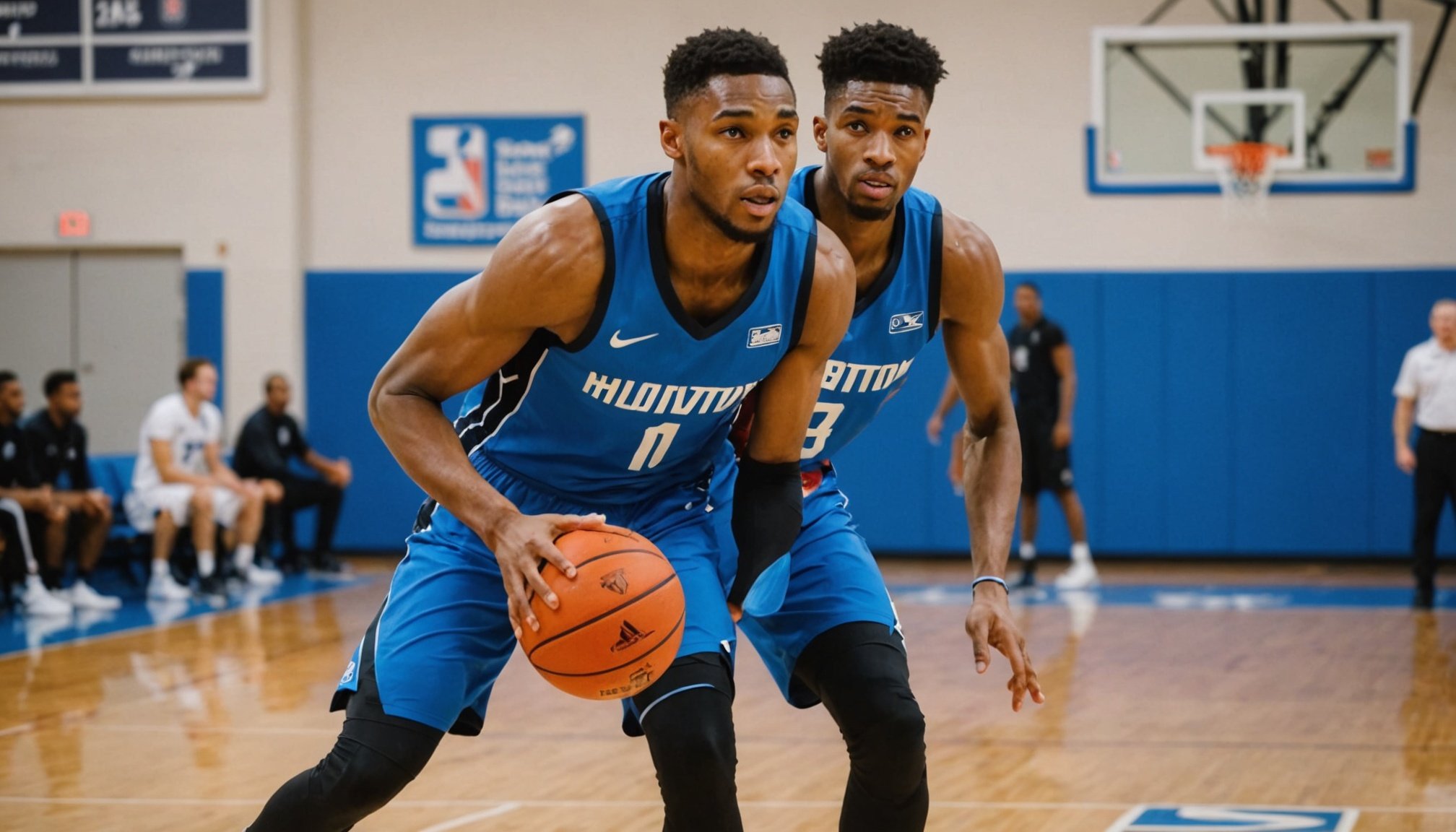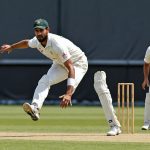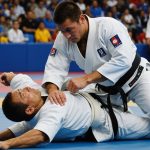Importance of Hydration for Basketball Athletes
Ensuring adequate hydration for athletes is crucial, especially for those engaged in high-intensity sports like basketball. Maintaining optimal fluid intake is directly connected to basketball performance and overall stamina. Proper hydration helps in the efficient regulation of body temperature, which in turn, enhances endurance. When athletes are well-hydrated, they can sustain energy levels, react faster, and concentrate better during both training and competitive games.
Impact of Hydration on Performance and Stamina
Hydration significantly impacts an athlete’s speed, agility, and strength. Consuming sufficient fluids can delay fatigue, allowing for longer, more effective play sessions. It also enables faster recovery times, which is vital during tournaments with games spaced closely together.
Also to discover : Enhancing court awareness: top strategies for uk basketball players to elevate spatial vision
Consequences of Dehydration in Basketball
Dehydration can lead to muscle cramps, reduced coordination, and decreased cognitive function. For basketball players, this translates to missed shots, slower movements, and a higher risk of injuries. Fluid loss as little as 2% of body weight can negatively impact basketball performance. Therefore, replacing lost fluids is critical.
Hydration Needs During Training and Games
Athletes should consume fluids before, during, and after activities. Starting games well-hydrated sets a strong foundation. Regular breaks to rehydrate during practice sessions are equally important. Post-game, it’s essential to replenish fluids to aid recovery and prepare for subsequent activities. This ensures that players remain at their best, both physically and mentally.
In the same genre : Speed secrets: proven techniques for uk basketball athletes to boost defensive reaction times
Optimal Fluid Intake Strategies
In the realm of sports and daily routines, understanding fluid intake is crucial for maintaining optimal performance. The body’s needs are highly individual, affected by activity levels and environmental conditions.
Daily Hydration Guidelines
Daily guidelines for fluid intake offer a foundational approach, emphasizing the importance of adapating to one’s personal physiology. Generally, recommendations suggest consuming half an ounce to an ounce of water for each pound of body weight. Thus, a 150-pound individual might aim for between 75 to 150 ounces daily.
Hydration Before, During, and After Games
Timing and adjusting hydration can significantly enhance performance on game days. Prior to an event, athletes should aim to be well-hydrated, consuming 17-20 ounces approximately two hours before. During the activity, sips of 7-10 ounces every 10 to 20 minutes help maintain balance. Post-game hydration should replenish any deficits incurred, often equating to around 24 ounces per pound lost through sweat.
Adjusting Fluid Intake to Activity Levels
Fluid intake must adapt to the intensity and nature of physical activity. Higher exertion requires increased hydration. Athletes should monitor practice intensity and adjust hydration strategies accordingly, especially in high-temperature environments.
By understanding these guidelines and hydration strategies, individuals can achieve optimal fluid balance, ensuring both health and peak athletic performance.
Electrolyte Balance and Recovery
In the realm of athletic performance, maintaining electrolyte balance is pivotal. Electrolytes are minerals in the body that hold an electric charge, playing a crucial role in sustaining necessary bodily functions such as muscle contractions and nerve signals. For athletes engaged in intense training or competitions, an imbalance can sharply decrease performance levels and lead to issues like muscle cramps and fatigue.
Signs of electrolyte imbalance in athletes can be subtle or pronounced. Common indicators include persistent muscle cramps, dizziness, headaches, and a general sense of fatigue. These symptoms arise because electrolytes like sodium and potassium are crucial for maintaining water balance within the body, influencing hydration levels.
To support recovery, athletes should focus on appropriate electrolyte sources and consider supplements. Natural sources include bananas, which are rich in potassium, and dairy products, which offer calcium. Hydration is equally as important. Sports drinks that are tailored for hydration science can effectively replenish lost electrolytes. These drinks often contain a blend of sodium and potassium, addressing immediate needs post-exercise.
For more personalized recovery tips, athletes might consider consulting with a sports nutritionist. Such experts can recommend tailored strategies and preferences. Keeping informed about electrolyte dynamics ensures athletes optimise their performance and find their way back to peak condition efficiently.
Expert Tips and Product Recommendations
Keeping well-hydrated is crucial for athletes, especially those playing intensive sports like basketball. Let’s explore effective hydration solutions available in the UK, coupled with insights from athletes and experts.
Best Hydration Products for Basketball
When selecting hydration products, athletes should consider options that effectively replenish electrolytes and fluids lost during play. In the UK, products like electrolyte tablets, sports drinks, and hydration packs have gained popularity. These solutions are tailored to support optimal performance by quickly restoring hydration levels.
Real-Life Examples from UK Athletes
UK athletes have shared their success with various hydration strategies. For instance, a renowned basketball player emphasises using electrolyte-rich solutions mid-game. His testimonial highlights the importance of personalised hydration plans that adjust continuously based on climate and individual needs. These real-life examples underscore that effective hydration is integral to maintaining peak performance and stamina.
Expert Advice from Sports Nutritionists
According to sports nutritionists, a comprehensive hydration strategy involves more than just fluid intake. They advise integrating hydration products into an athlete’s routine, ensuring balance in sugar and electrolyte levels. Nutritionists suggest evaluating personal sweat rates and activity intensity, tailoring solutions to individual requirements. By adhering to these expert tips, athletes can ensure they’re consistently performing at their best.
Hydration Challenges for UK Athletes
Understanding the hydration challenges faced by UK athletes requires recognising the unique demands of outdoor sports. Basketball players, in particular, contend with these issues due to the sport’s high-intensity nature. Unlike sports with intervals allowing frequent fluid intake, basketball requires continuous play, making substantial rehydration difficult during games.
The unpredictable UK climate adds an extra layer of complexity to these hydration challenges. Athletes often face variable conditions—from sudden showers to high humidity—each affecting fluid loss differently. Colder conditions might reduce the perceived need for hydration, but sweating remains a significant factor due to exertion levels. On warmer days, increased temperatures can exacerbate dehydration risks, underscoring the importance of being proactive with hydration strategies.
Cultural practices also influence hydration habits. In the UK, there’s a common tendency to undervalue the importance of hydration until signs of dehydration become evident. This cultural disposition is compounded by a lack of awareness regarding adequate fluid intake requirements for different climate factors. Encouraging athletes to adopt a routine of regular hydration, irrespective of thirst, can help address these challenges. Additionally, local customs may not always emphasise the use of electrolyte-replenishing drinks, potentially affecting athletes’ ability to maintain optimal hydration levels during strenuous activities.











